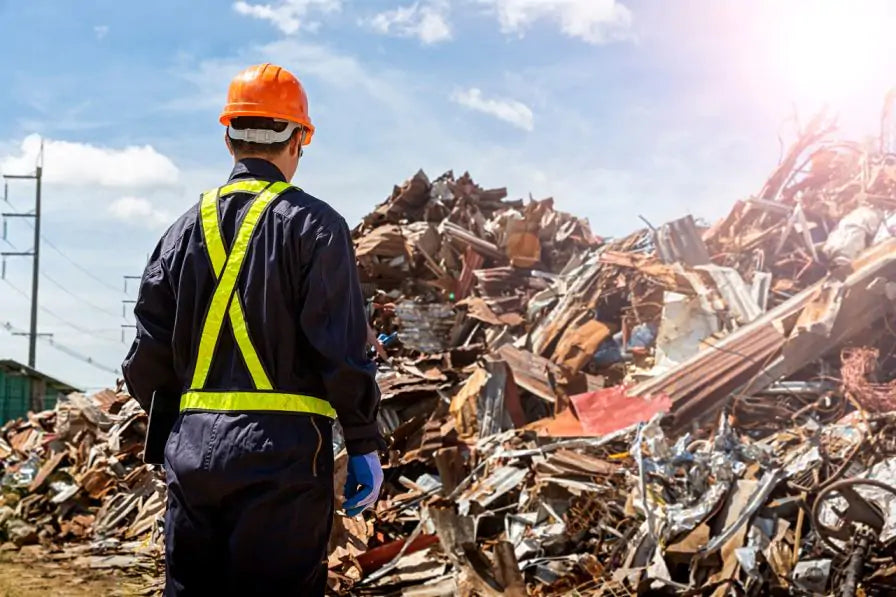Your basket is currently empty.
Shop NowA Brief History of Recycling and How You Can Help

A Brief History of Recycling and How You Can Help
The familiar international recycling symbol is used worldwide to mark products that can and should be recycled. Recycling is nothing new. In fact, as far back as 400 BC, during the time when Plato was the Philosopher in Chief, people discussed the benefits of recycling.
During times of scarcity, people conserve more, reuse more, and recycle more. War times throughout the ages have been such times of scarcity. World War II marketing campaigns by the War Department to encourage people to do more and to segregate rubbish for easy processing.
Before the world became industrialised, metals of all different types were collected and melted for reuse. In pre-industrial Britain, so-called dustmen gathered ash and dust from fires and sold it to brick makers as a raw material.
As railroads and automobiles came on the scene, those industries relied on scrap metal. Glass drink bottles and later steel and aluminium drink cans have long been a staple of those hoping to secure pocket change by turning them in for reprocessing.
Today, due to the poor economy that the entire globe is struggling with, theft of scrap metal is one of the most prolific crimes. Measures have been taken in the USA and the UK (and most of the civilised world) to reduce the crime by making it more difficult for those who steal scrap metal to sell it. Tougher licensing laws, stiffer penalties and proactive law enforcement task forces have been working diligently to get the problem under control
Reprocessing aluminium requires only about 5% of the energy used in the original production. That is an energy saving of 95%. Other recyclate show less return on investment, but still it is cheaper to reprocess than to engage in production from scratch.
With sprawling populations after World War II, land and space was precious. Rising populations also meant rising tides of waste that needed to be placed somewhere. Landfills became the first line of defense, but it became clear that landfills alone did not constitute a sustainable solution.
That was why in the 1970's earnest attention was paid to the concept of recycling as much rubbish as was possible. Starting simply, early efforts were aimed at paper, cardboard and glass. Today, there are bins at most recycling centres for just about any manner of rubbish that you can imagine.

As fears of carbon emissions, dirty air and water, litter, mountains of garbage and global warming grew, people looked to recycling even more. Waste reduction, recycling and reusing materials are sure ways to combat all of these problems.
The key ingredient to the solution, however, is sometimes missing, or rather, AWOL. That is the human ingredient, the consumer who fancies himself too busy or too above the task to sort through rubbish in a way that makes it easier to be recycled.
Only when the consumer gets completely involved in the process will it work effectively and efficiently. In Wales, it has been reported that in the third quarter of 2012 over 54 percent of waste was recycled. England showed only about 43 percent recycled.
Getting involved in your local programmes and helping educate and motivate others in the community is an excellent way to truly spread the wealth of benefits that are derived from recycling. One person cannot do it all, but it all starts with one person doing their part.
The most urgent action that one can take to improve the quality of their personal recycling effort if to make the decision to sort and segregate all rubbish properly according to the regulations of the local council and recycling centre.
This will require dedication, time and commitment. The work is dirty and it's tedious. Proper protection is recommended for the eyes, airways and hands. Safety goggles, dust masks and cut resistant gloves will provide the desired protection and help make sorting rubbish a less painful task.
- Break down your rubbish to the fullest extent applicable to your local council's regulations. Some will only specify a partial segregation, such as paper, cardboard and textiles in one bin and glass, plastic and metal in another.
- If your recycling centre facilitates additional segregation then that is the best way to proceed. All items should be cleaned of fluid, food or other any remnant material. While it is not necessary to run the items through your dishwasher, it is a good idea to rinse them thoroughly.
- Cleaning rubbish such as food cans and bottles helps to prevent bacterial contamination. Crushing bottles and cans flat will help conserve space where they are stored.
Take the time to learn, educate and motivate those around you, whether that be in the office or home.






